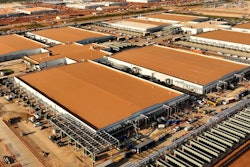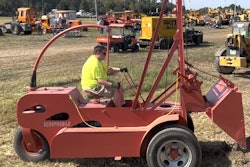AEM President Dennis Slater submitted testimony to Congress yesterday for a hearing on “Stimulating the Economy Through Trade.
Slater presented to the House Committee on Energy and Commerce’s Subcommittee on Commerce, Trade and Consumer Protectionwhat he said is the importance of global trade to the off-road equipment manufacturing industry.
Slater noted that international trade is a critical asset to American manufacturers, particularly during the current economic crisis and pointed out that “it is especially important to promote participation in the global economy instead of turning back to a protectionist strategy. Protectionism will stifle economic growth globally and prolong a down-sloping economy.”
Here is his testimony:
The U.S. Economy and Trade
International trade is a critical asset to American manufacturers, particularly during these difficult economic times. Opportunities in foreign markets have enabled our member manufacturers to prosper and maintain growth in recent years. During this current economic crisis it is especially important to promote participation in the global economy instead of turning back to a protectionist strategy. Protectionism will stifle economic growth globally and prolong a down-sloping economy.
Some 96 percent of the world’s consumers live outside the United States. U.S. producers must be able to reach those consumers to expand the U.S. economy and to create jobs. About one of every five factory jobs – or 20 percent of all jobs in America’s manufacturing sector – depends on exports. And workers in jobs supported by exports typically receive wages higher than the national average.
U.S. industrial equipment manufacturers can compete anywhere in the world if given a level playing field. We know the positive effects of trade and open markets and are responding through an aggressive trade strategy which includes new products and thinking globally. And it is not only large manufacturers, but also small and medium enterprises (SMEs), who benefit. Small businesses create 70 percent of the new jobs in America and they account for almost 97 percent of U.S. exporters. For example, AEM member and “SME” Stone Construction Equipment, Inc. of Honeoye, NY, with fewer than 500 employees, is a global exporter.
According to Lynne Woodworth, President of Stone, “Trade gives Stone access to the 96% of the world’s population that lives outside the U.S. borders. Trade is critical because Stone has many untapped markets. Also, as a privately held, employee-owned company, revenue growth from trade in other parts of the world makes it possible for us to continue to invest in American manufacturing and the American worker.” This is just one of many stories from small equipment manufacturers who benefit here in the U.S. from exports.
Construction machinery exports close out 2008 with 20-percent gain
Despite downturns in the U.S. economy, many manufacturers were able to report strong profits for 2008 mainly because of exports. U.S. construction equipment exports totaled more than $20.7 billion for 2008, which translates into a 20-percent gain over the previous year, according to the AEM’s recently released quarterly export trend reports. South America and Asia were among the market leaders for purchases of American-made construction machinery.
Global trade, especially to emerging markets, was a mainstay of our resurgence in recent years. Obviously the situation is much different today. Our industry sector, as with the manufacturing community overall, has been devastated by the abrupt downturn in 2008. These export results were helped by trading terms such as letters of credit, which kept goods in the delivery pipeline.
The AEM trade group consolidates U.S. Commerce Department data for off-road equipment with other sources into quarterly export trend reports. Some relevant figures:
Export sales to South America grew 44 percent in 2008 for a total of $3.3 billion compared to 2007. Asia took delivery of $3 billion worth of U.S. construction equipment, an increase of 25 percent, and exports to Central America grew 19 percent in 2008, for a total of $2 billion.
Export business to Europe gained 11 percent with purchases of $3 billion in 2008, and construction machinery exports to Canada increased 13 percent for a total of $6.2 billion.
Africa recorded purchases of $1.4 billion worth of U.S. construction equipment, an increase of 29 percent. And, exports to Australia/Oceania grew 14 percent, to $1.8 billion.
Farm equipment exports for 2008 increase 26 percent
Further, AEM’s export trend reports indicate that U.S. exports of agricultural-related machinery totaled $10.4 billion in 2008, an increase of 26 percent compared to the previous year. Australia/Oceania led the way in percentage growth, followed by Canada, South America and Europe.
Export growth was strongest in the first quarter of the year and then dropped substantially by the third quarter. The farming sector has not been immune to the global economic downturn, with continued uncertain conditions around the world, and in some instances staggering economic reversals of recent positive trends in certain world regions.
U.S. farm equipment exports to Australia/Oceania totaled $794 million, a 59-percent increase for 2008. Exports to Canada grew 31 percent in 2008, with purchases totaling $2.8 billion. South America took delivery of $888 million worth of American-made agricultural equipment in 2008, a gain of 29 percent, and exports to Europe increased 23 percent and totaled $4 billion.
Asia bought $793 million worth of U.S. agricultural machinery, a 12-percent increase, while Central America’s export purchases of $813 million represented a 13-percent increase. Africa’s farm equipment export purchases were $299 million, a gain of 21 percent.
Trade protectionism is bad for the U.S. economy
The U.S. last month passed an enormous recovery bill to stimulate the economy and many other nations are following suit with their own economic stimulus packages that could provide opportunities for U.S. equipment manufacturers. Unfortunately, U.S. manufacturers may be left behind because of restrictions such as “Buy America” that may lead to retaliation by our trading partners. Leaders from around the world have warned that they will return the favor by also restricting U.S. manufacturers from infrastructure projects in their countries, thereby exacerbating an already dire situation. The European Union’s trade commissioner declared that “the one thing we can be absolutely certain about, is if a bill is passed which prohibits the sale or purchase of European goods on American territory, that is something we will not stand idly by and ignore.” The Canadian government has also urged the U.S. to reject protectionist pressures, abide by our promises of open and fair trade, and live up to our treaty obligations.
U.S. equipment manufacturers understand that stimulus spending alone cannot save all the manufacturing jobs lost due to the economic crisis, and our companies are making the changes necessary to adapt. However, we must have fair access to other infrastructure projects globally to maximize our ability to recover and to strengthen – access to those markets is key to helping the economy here at home. Take, for example, the U.S. infrastructure funding from the stimulus, which is less than $120 billion, and compare that to the $200 billion China is spending on infrastructure or the $400 billion that Saudi Arabia will spend over the next five years on infrastructure projects. The market opportunities created by the massive investment of these and other countries will help to keep plants operating and save millions of jobs in the U.S., but if our government restricts our trading partners from the U.S. market, U.S. manufacturers will certainly face retaliation.
Additionally, President Obama’s recently announced trade policy agenda gave credence to concerns that we are seeing a reemergence of protectionist philosophy. This philosophy has been proven over time to be counter-productive to American manufacturing, and thus detrimental to the people and communities relying on the jobs, taxes and other benefits that a strong manufacturing sector provides. Instead of moving forward with the Free Trade Agreements (FTAs) already signed with Panama, Colombia, and South Korea, the President now says these key FTAs need more review. The President also indicates he intends to give NAFTA another look, which cannot inspire confidence in our most important trading partners, Canada and Mexico. After the good faith and hard work invested in these agreements, it is an insult to our valued friends and allies and to our vital trading relationships to now revisit signed agreements, which seems to be the course of action proposed by the Administration.
AEM urges Congress to approve the FTAs with Colombia, Panama and South Korea and not to reopen NAFTA. FTAs contribute to a higher quality of life and benefit businesses, workers, and consumers in significant ways. These agreements open foreign markets to U.S. exporters and investors. With a stalled Doha round in the World Trade Organization (WTO) negotiations, bilateral and multilateral agreements such as the ones already in effect are even more critical in fostering expanded trade across borders. In contrast to the U.S., the European Union is joining East Asian and Latin American countries in negotiating dozens of FTAs. Our failure to pursue FTAs could very well cost U.S. manufacturers much needed competitive advantages by keeping the playing field tilted in favor of our competitors.
Conclusion
AEM welcomes the opportunity to provide these comments on how to stimulate the economy through trade. As indicated above, AEM very strongly urges the United States not to seek refuge in the false comfort of protectionism, but instead to work together with our trading partners to weather the storm of this economic crisis. Industrial equipment manufacturers provide the machines that improve operations and reduce costs of any infrastructure project. Our members’ high-quality machines are critical to delivering the “shovel ready” jobs needed to meet the President’s objective to “keep the U.S. economy strong and competitive.” With such a huge infrastructure task ahead, additional restrictions will only delay the promise to the American people to maintain their jobs and to stimulate the economy.
About AEM









